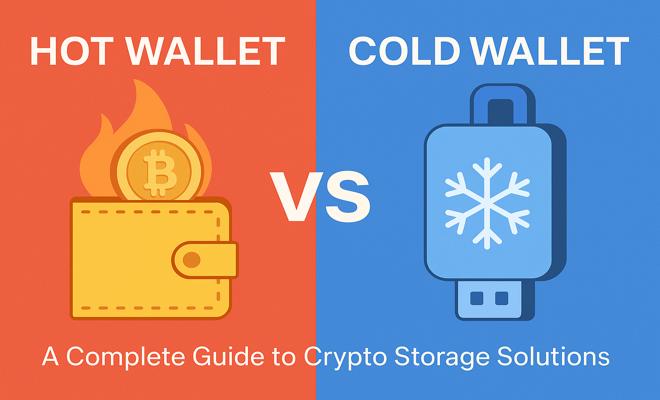
🔥❄️ Hot Wallet vs Cold Wallet: A Complete Guide to Crypto Storage Solutions
🔐 Why Wallets Matter in the Crypto World
When it comes to cryptocurrency, safety and convenience are everything. Whether you're an experienced investor or a total beginner, the wallet you choose will play a huge role in protecting your digital assets. That's why it's important to understand the two main types of wallets: hot wallets and cold wallets.
💼 What is a Crypto Wallet?
A crypto wallet is a digital tool that allows you to store, send, and receive cryptocurrencies like Bitcoin (BTC), Ethereum (ETH), and thousands of other digital assets. Think of it as your personal bank account for crypto — but with complete control over your funds.
There are two main types of wallets:
- 🔥 Hot Wallets – Connected to the internet, ideal for quick access
- ❄️ Cold Wallets – Offline, built for maximum security
🔥 What is a Hot Wallet?
A hot wallet is always connected to the internet. This makes it perfect for people who trade regularly or use their crypto for day-to-day activities. These wallets come in many forms and are usually free and easy to use.
✅ Popular Hot Wallet Options:
- 📱 Mobile wallets: Trust Wallet, MetaMask
- 💻 Desktop wallets: Exodus, Electrum
- 🧩 Browser extensions: MetaMask for Chrome/Firefox
👍 Pros of Hot Wallets:
- ⚡ Instant access to your crypto
- 👨💻 User-friendly and great for beginners
- 💸 Most are free to download and use
⚠️ Cons of Hot Wallets:
- 🔓 Higher risk of online hacks and phishing
- 🛡️ Requires constant updates and vigilance
- 📡 Always online = always exposed
❄️ What is a Cold Wallet?
A cold wallet is not connected to the internet. That’s right — it’s completely offline. This makes it incredibly safe from online threats. Cold wallets are ideal for those who plan to HODL (hold long-term) their crypto and don’t need daily access.
✅ Common Cold Wallet Options:
- 🔐 Hardware wallets: Ledger Nano X, Trezor
- 🖨️ Paper wallets: Printed QR codes and keys
- 💾 Air-gapped devices: Isolated USB drives or computers
👍 Pros of Cold Wallets:
- 🛡️ Superior security — immune to online threats
- 🔒 Ideal for long-term crypto storage
- 🧘 Peace of mind for HODLers
⚠️ Cons of Cold Wallets:
- ⌛ Not ideal for frequent transactions
- 💔 If lost or damaged, recovery can be tough
- 💰 Hardware wallets come with a price tag
⚖️ Hot Wallet vs Cold Wallet: Side-by-Side Comparison
| Feature | Hot Wallet 🔥 | Cold Wallet ❄️ |
|---|---|---|
| Internet Connection | Yes 🌐 | No 🚫 |
| Security Level | Medium 🔓 | High 🔐 |
| Ease of Use | Very Easy 👍 | Moderate 👌 |
| Best For | Daily trading 📈 | Long-term holding 🐢 |
| Cost | Usually Free 💸 | May Require Purchase 💰 |
🛡️ Essential Tips for Keeping Your Crypto Safe
No matter what kind of wallet you use, your digital assets are only as safe as your habits. Here are some crucial security tips every crypto user should follow:
- ✅ Always enable Two-Factor Authentication (2FA)
- ❌ Never share your private key or seed phrase
- 💾 Backup your wallet in multiple secure places
- 🛠️ Keep your wallet software updated at all times
- 🧠 Stay informed about common scams and phishing techniques
💡 So, Which Wallet Should You Choose?
It all depends on your crypto goals:
- 👨💼 If you're an active trader or use crypto daily, a hot wallet makes life easier.
- 🏦 If you're holding large amounts of crypto long-term, a cold wallet is the safest choice.
Pro Tip: Many experienced users combine both types. They keep a small portion in a hot wallet for convenience and the majority in a cold wallet for security 🔁.